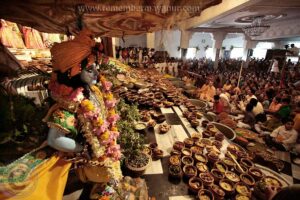
We must always remember in these stories that when we are dealing with such great personalities, that the small flaws always have to be overlooked because they have such great qualities. So we are not worried about these small, seeming flaws. But at the same time we must learn from these flaws that they have, just as we are to learn from their good qualities. Because the point is is, it doesn't matter who you are, with these, if there is something improper, then that will give a reaction. So even if you are as great a personality as Pāṇḍu, still there will be a problem if you don't act properly. At the same time, because of so many great qualities, anything that may be a problem is overlooked.
Means, this is the nature of human life, is there must always be a balance in all these different things. One has to see what is good, follow that; see what should not be followed and be very careful to avoid that. Means, we have to be very careful about just being cut and dried. So, in other words, it has to be, the practical, personal aspect has to be seen. Otherwise then we either reject something that is valuable or we become so fixed in it that we don't actually balance it with other things properly. So, basically how it works is: we see our faults, others see our good qualities. This is how the pious person sees things. A not so pious view is that we see all the good qualities in ourself and all the bad qualities in others - also a very popular way of viewing things.
So, even though we see that Pāṇḍu may have had some faults, the sages and the Siddhas, the Cāraṇas, they did not see those at all. One must always remember: if there were no faults, you wouldn't be here. That is the whole point. It's like we go to a hospital and then we expect everyone in the hospital should be in perfect health. It would be like when the doctor comes into the room and we point out to the doctor, 'Hey, this guy in the next bed doesn't look well. What is he doing here?' We must always remember, just as we may have some faults, others also may have faults. Therefore, if we want to get good association, we see the good qualities in others. And then the bad qualities... I mean, we see the good in others, and then our own bad qualities, we have to see those, so we can work on removing them from the heart, purifying ourselves.
So we can see that it was not that the sages thought, 'Ugh, this lusty king, killed himself... First he killed some sage, now he kills himself. What do we want to have anything to do with this guy?' But they are seeing the greatness of the king and what he can actually do. He can establish the proper justice and virtue on the planet by his prowess. He himself is very detached from the royal life and prefers this simple, ascetic life. And his people, the citizens, they have great affection for him. And so, this is how the sages were seeing, so they performed all the proper rituals for Pāṇḍu, performing the rituals with sobriety and attention.

